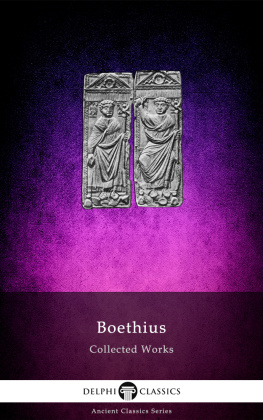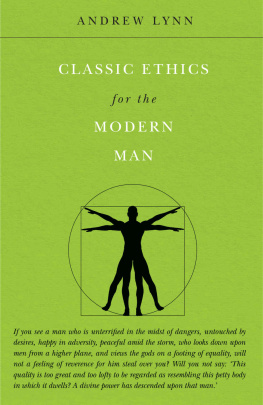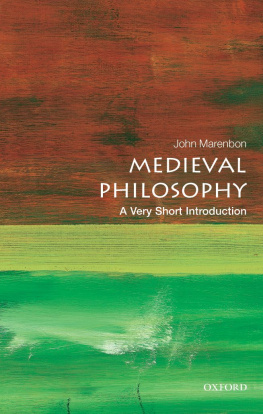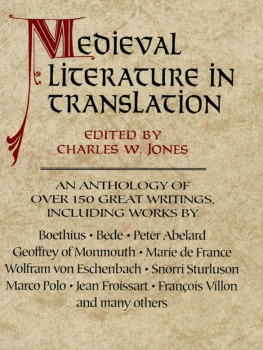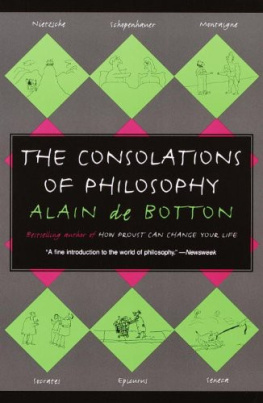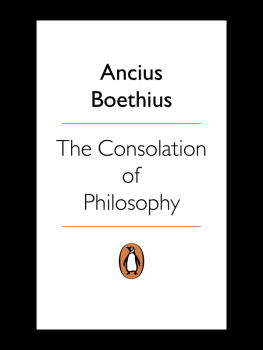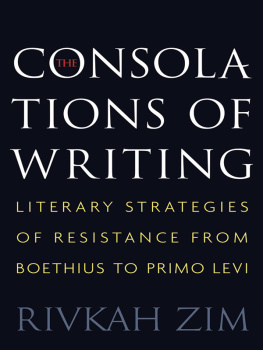Boethius - Consolation of Philosophy
Here you can read online Boethius - Consolation of Philosophy full text of the book (entire story) in english for free. Download pdf and epub, get meaning, cover and reviews about this ebook. genre: Science. Description of the work, (preface) as well as reviews are available. Best literature library LitArk.com created for fans of good reading and offers a wide selection of genres:
Romance novel
Science fiction
Adventure
Detective
Science
History
Home and family
Prose
Art
Politics
Computer
Non-fiction
Religion
Business
Children
Humor
Choose a favorite category and find really read worthwhile books. Enjoy immersion in the world of imagination, feel the emotions of the characters or learn something new for yourself, make an fascinating discovery.
Consolation of Philosophy: summary, description and annotation
We offer to read an annotation, description, summary or preface (depends on what the author of the book "Consolation of Philosophy" wrote himself). If you haven't found the necessary information about the book — write in the comments, we will try to find it.
Consolation of Philosophy — read online for free the complete book (whole text) full work
Below is the text of the book, divided by pages. System saving the place of the last page read, allows you to conveniently read the book "Consolation of Philosophy" online for free, without having to search again every time where you left off. Put a bookmark, and you can go to the page where you finished reading at any time.
Font size:
Interval:
Bookmark:
The Project Gutenberg EBook of The Consolation of Philosophy, by Boethius
This eBook is for the use of anyone anywhere at no cost and with
almost no restrictions whatsoever. You may copy it, give it away or
re-use it under the terms of the Project Gutenberg License included
with this eBook or online at www.gutenberg.net
Title: The Consolation of Philosophy
Author: Boethius
Release Date: December 11, 2004 [EBook #14328]
Language: English
*** START OF THIS PROJECT GUTENBERG EBOOK THE CONSOLATION OF PHILOSOPHY ***
Produced by Jonathan Ingram, Karina Aleksandrova and the PG Online
Distributed Proofreading Team.
,
, ,
.
[Greek: homs de kai en toutois dialampei to kalon,
epeidan pher tis eukols pollas kai megalas
atychias, m di analgsian, alla gennadas
n kai megalopsychos.]
Aristotle's 'Ethics,' I., xi. 12.
Diptych representing Narius Manlius Boethius, father of Anicius Manlius Severinus Boethius. The inscription in full would run thus:
NARivs MANLivs BOETHIVS Vir Clarissimvs ET INLvstris
EXPraefectvs Praetorio Praefectvs VrbiS Et
Comes Consvl ORDinarivs ET PARTICivs
(For description vid. Preface, p. vi)
CH. CH. OXFORD.
Quantumlibet igitur sviant mali, sapienti tamen corona non decidet, non arescet.
Melioribus animum conformaveris, nihil opus est judice prmium deferente, tu te ipse excellentioribus addidisti; studium ad pejora deflexeris, extra ne qusieris ultorem, tu te ipse in deteriora trusisti.
LONDON:
ELLIOT STOCK, 62, PATERNOSTER ROW.
1897.
The book called 'The Consolation of Philosophy' was throughout the Middle Ages, and down to the beginnings of the modern epoch in the sixteenth century, the scholar's familiar companion. Few books have exercised a wider influence in their time. It has been translated into every European tongue, and into English nearly a dozen times, from King Alfred's paraphrase to the translations of Lord Preston, Causton, Ridpath, and Duncan, in the eighteenth century. The belief that what once pleased so widely must still have some charm is my excuse for attempting the present translation. The great work of Boethius, with its alternate prose and verse, skilfully fitted together like dialogue and chorus in a Greek play, is unique in literature, and has a pathetic interest from the time and circumstances of its composition. It ought not to be forgotten. Those who can go to the original will find their reward. There may be room also for a new translation in English after an interval of close on a hundred years.
Some of the editions contain a reproduction of a bust purporting to represent Boethius. Lord Preston's translation, for example, has such a portrait, which it refers to an original in marble at Rome. This I have been unable to trace, and suspect that it is apocryphal. The Hope Collection at Oxford contains a completely different portrait in a print, which gives no authority. I have ventured to use as a frontispiece a reproduction from a plaster-cast in the Ashmolean Museum, taken from an ivory diptych preserved in the Bibliotheca Quiriniana at Brescia, which represents Narius Manlius Boethius, the father of the philosopher. Portraiture of this period is so rare that it seemed that, failing a likeness of the author himself, this authentic representation of his father might have interest, as giving the consular dress and insignia of the time, and also as illustrating the decadence of contemporary art. The consul wears a richly-embroidered cloak; his right hand holds a staff surmounted by the Roman eagle, his left the mappa circensis, or napkin used for starting the races in the circus; at his feet are palms and bags of moneyprizes for the victors in the games. For permission to use this cast my thanks are due to the authorities of the Ashmolean Museum, as also to Mr. T.W. Jackson, Curator of the Hope Collection, who first called my attention to its existence.
I have to thank my brother, Mr. L. James, of Radley College, for much valuable help and for correcting the proof-sheets of the translation. The text used is that of Peiper, Leipsic, 1874.
Anicus Manlius Severinus Boethius lived in the last quarter of the fifth century A.D., and the first quarter of the sixth. He was growing to manhood, when Theodoric, the famous Ostrogoth, crossed the Alps and made himself master of Italy. Boethius belonged to an ancient family, which boasted a connection with the legendary glories of the Republic, and was still among the foremost in wealth and dignity in the days of Rome's abasement. His parents dying early, he was brought up by Symmachus, whom the age agreed to regard as of almost saintly character, and afterwards became his son-in-law. His varied gifts, aided by an excellent education, won for him the reputation of the most accomplished man of his time. He was orator, poet, musician, philosopher. It is his peculiar distinction to have handed on to the Middle Ages the tradition of Greek philosophy by his Latin translations of the works of Aristotle. Called early to a public career, the highest honours of the State came to him unsought. He was sole Consul in 510 A.D., and was ultimately raised by Theodoric to the dignity of Magister Officiorum, or head of the whole civil administration. He was no less happy in his domestic life, in the virtues of his wife, Rusticiana, and the fair promise of his two sons, Symmachus and Boethius; happy also in the society of a refined circle of friends. Noble, wealthy, accomplished, universally esteemed for his virtues, high in the favour of the Gothic King, he appeared to all men a signal example of the union of merit and good fortune. His felicity seemed to culminate in the year 522 A.D., when, by special and extraordinary favour, his two sons, young as they were for so exalted an honour, were created joint Consuls and rode to the senate-house attended by a throng of senators, and the acclamations of the multitude. Boethius himself, amid the general applause, delivered the public speech in the King's honour usual on such occasions. Within a year he was a solitary prisoner at Pavia, stripped of honours, wealth, and friends, with death hanging over him, and a terror worse than death, in the fear lest those dearest to him should be involved in the worst results of his downfall. It is in this situation that the opening of the 'Consolation of Philosophy' brings Boethius before us. He represents himself as seated in his prison distraught with grief, indignant at the injustice of his misfortunes, and seeking relief for his melancholy in writing verses descriptive of his condition. Suddenly there appears to him the Divine figure of Philosophy, in the guise of a woman of superhuman dignity and beauty, who by a succession of discourses convinces him of the vanity of regret for the lost gifts of fortune, raises his mind once more to the contemplation of the true good, and makes clear to him the mystery of the world's moral government.
- BOOK I.
THE SORROWS OF BOETHIUS.- SONG PAGE
- I. BOETHIUS' COMPLAINT
- II. HIS DESPONDENCY
- III. THE MISTS DISPELLED
- IV. NOTHING CAN SUBDUE VIRTUE
- V. BOETHIUS' PRAYER
- VI. ALL THINGS HAVE THEIR NEEDFUL ORDER
Font size:
Interval:
Bookmark:
Similar books «Consolation of Philosophy»
Look at similar books to Consolation of Philosophy. We have selected literature similar in name and meaning in the hope of providing readers with more options to find new, interesting, not yet read works.
Discussion, reviews of the book Consolation of Philosophy and just readers' own opinions. Leave your comments, write what you think about the work, its meaning or the main characters. Specify what exactly you liked and what you didn't like, and why you think so.





